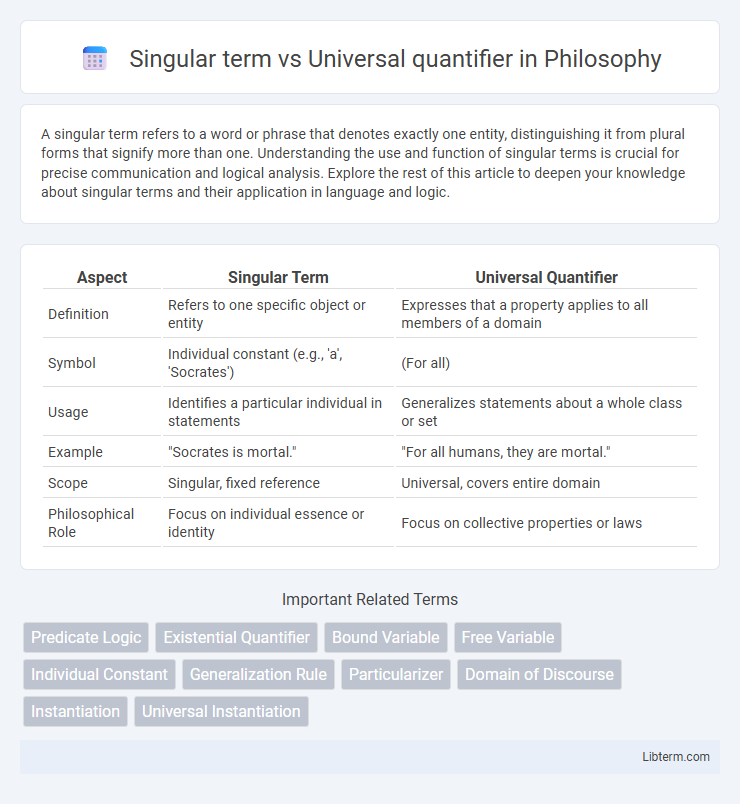A singular term refers to a word or phrase that denotes exactly one entity, distinguishing it from plural forms that signify more than one. Understanding the use and function of singular terms is crucial for precise communication and logical analysis. Explore the rest of this article to deepen your knowledge about singular terms and their application in language and logic.
Table of Comparison
| Aspect | Singular Term | Universal Quantifier |
|---|---|---|
| Definition | Refers to one specific object or entity | Expresses that a property applies to all members of a domain |
| Symbol | Individual constant (e.g., 'a', 'Socrates') | (For all) |
| Usage | Identifies a particular individual in statements | Generalizes statements about a whole class or set |
| Example | "Socrates is mortal." | "For all humans, they are mortal." |
| Scope | Singular, fixed reference | Universal, covers entire domain |
| Philosophical Role | Focus on individual essence or identity | Focus on collective properties or laws |
Understanding Singular Terms: A Definition
Singular terms refer to expressions that denote a specific, individual entity within a domain, such as proper names or definite descriptions like "Socrates" or "the tallest building in Paris." These terms uniquely identify one object, enabling precise reference in logical analysis or linguistic interpretation. In contrast, universal quantifiers, symbolized as in predicate logic, express statements about all elements within a set, such as "for all x," and do not single out any particular individual.
Unpacking the Universal Quantifier
The universal quantifier, symbolized as , denotes that a given predicate applies to all elements within a particular domain, contrasting with singular terms that refer to a specific individual entity. In formal logic, unpacking the universal quantifier involves transforming statements like "x P(x)" into conditions asserting "P(a)" holds for every element a in the domain of discourse. This semantic unpacking clarifies how universal quantification expresses generality, ensuring that the predicate's truth extends universally rather than to isolated instances.
Key Differences: Singular Term vs Universal Quantifier
A singular term refers to a specific, individual entity, such as a proper name or a definite description, while a universal quantifier is a logical operator used to express that a predicate applies to all members of a domain, typically symbolized as . Singular terms denote particular objects, enabling precise reference in propositions, whereas universal quantifiers generalize statements across entire sets or classes. The key difference lies in their scope: singular terms identify one unique individual, whereas universal quantifiers assert properties or relations about every element within a specified universe of discourse.
Examples of Singular Terms in Logic
Singular terms in logic refer to specific, individual entities such as proper names or definite descriptions, for example, "Socrates," "the Eiffel Tower," or "the current president of the United States." These terms denote particular objects within the domain of discourse, distinguishing them from universal quantifiers like "forall" () that apply propositions to all members of a set. Understanding the role of singular terms aids in precise logical analysis and formalization of statements involving unique referents.
How Universal Quantifiers Function in Statements
Universal quantifiers function in statements by asserting that a specific property or predicate applies to all elements within a particular domain, such as "for all x." Unlike singular terms, which refer to a specific individual entity, universal quantifiers generalize the statement to encompass every member of the set. This logical tool enables expressing broad truths, ensuring the statement holds universally rather than just for one case.
Linguistic Implications of Singular Terms and Universals
Singular terms, such as proper names or definite descriptions, refer to specific, identifiable entities within a linguistic context, enabling precise reference and disambiguation in communication. Universal quantifiers, like "all" or "every," express propositions that apply to entire classes or sets, facilitating generalizations and logical inferences in natural language semantics. Understanding the linguistic implications of singular terms versus universals enhances clarity in semantic interpretation and informs theories of meaning, reference, and quantification in language.
Role in Logical Argumentation
Singular terms refer to specific, individual objects within a domain, enabling precise identification in logical arguments. Universal quantifiers express statements about all elements within a domain, establishing generality and broad applicability in reasoning. Their interplay allows transitioning from particular instances to generalized conclusions, essential for robust logical proofs and argument structures.
Philosophical Significance of the Two Concepts
Singular terms refer to specific, individual entities, while universal quantifiers express properties or predicates that apply to all members of a given set. Philosophically, singular terms anchor meaning to particular objects, grounding reference and identity, whereas universal quantifiers enable generalization and the formulation of laws or principles applicable universally. This distinction underpins debates in metaphysics and logic regarding the nature of existence, categorization, and the scope of truth.
Common Misconceptions and Clarifications
Singular terms refer to specific, individual entities, while universal quantifiers express properties or statements that apply to all members of a domain. A common misconception is treating universal quantifiers as singular terms, leading to faulty conclusions about collective or individual reference. Clarifying this distinction ensures accurate logic formulation and prevents ambiguity in predicate logic and formal semantics.
Applications in Mathematical and Logical Reasoning
Singular terms refer to specific individual objects in mathematical and logical reasoning, enabling precise identification and manipulation of entities within proofs or algorithms. Universal quantifiers express properties or relations that hold true for all elements within a particular domain, facilitating the formulation of general theorems and logical statements. Applications in automated theorem proving, formal verification, and predicate logic rely heavily on the interplay between singular terms and universal quantification to ensure rigor and completeness in reasoning processes.
Singular term Infographic

 libterm.com
libterm.com